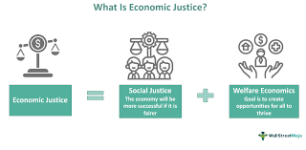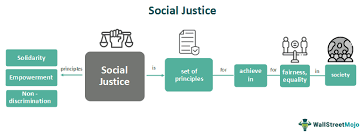Better Economic Management and Economy vs Social Justice
By: Amit Bhushan Date: 3rd Jan 2017
Between options of seeking votes for better economic management and seeking votes for Social Justice, we have a clear winner. Better Economy management or more pertinently ‘Development’ wins hands down. Most parties have taken the issue and prepared their various claims in this regards. Where confusion remains is comparative ranking of the states and the local governments which have been discontinued along with various claims about the impact of macro-economic policies of the center. What the party in power has not been able to depict is that most small businesses would be thriving if free from political interference and thus need to keep administrative and police mechanisms impartial along with clear and simplified regulations for such units. While the government at the center is seen pushing e-business, it has failed to publish e-procurement/e-transactions adoption in various states or municipalities or other local government units, development authorities etc. It has thus constantly left a wide arena open outside of its purview of digital push for improvement of transparency conceding the space to the political opposition to point out that charity begins at home. With a much wider geographic governance, showing better statistics for areas under management, should not have been a problem. Hereunder also lies promise for better maintenance of better overall internal security environment as well.
However, the national political parties would prefer this to be an issue of Economic management vs Social Justice with almost no reference to ‘better’ (delivery). This is because the netadom would almost constantly intervene with the ‘small business segment’ often manipulating the administrative machinery to pursue their designs. And the un-level playing field created helps them ensuring that their relevance as a ‘social bargaining point’ to seek ‘resolution’ for woes in business and sometimes even on non-business issues. The fact that most such business transactions are settled in cash and that the taxmen have no clear mechanisms to pursue either the people reporting large cash transactions or those reporting large number of cash transactions in business have supported the edifice. The case for under reporting revenues or excess expenses can almost never be verified. A suitable tax policy along with simplified business procedures would help curb political interference, but for lack of political will to pursue such an approach. The other is policy drives for tax simplification and uniformity such as the GST which would should government collect the revenue but also make difference between the compliant and non-compliant quite evident with simplified procedures. The ‘filing of returns should have mechanisms which can allow taxmen to concentrate on areas where there are reasons for doubts like significant ‘cash transactions’ (although may not be applicable in current scenario). Lastly, a strong complaint mechanism for businesses for mis-use of state machinery (including selective oversight) or against ‘Goonda’ elements.
Instead of making business hassle-free, we have the parties and netas harping on Social Justice related issues highlighting the divisive politics although each party would blame the other side. This is even as the issue is dead long-back from public memory and didn’t matter in 14’ general elections at all and where better economy management scored decisively. Then of course there were neglected areas like waterway transportation, natural gas and energy policy biases, inflation, failure of service delivery etc. along with core issue of jobs creation. Even though political parties and netas have fully realized that public would like political issue centered around ‘better economy management’ however they would do their best to keep key issues around ‘economy vs social justice’ and this may be true about the national political parties (both) as well. This is because the relationship between the neta and the political party or so to say, ‘core political leaders’ of the political parties is mostly ‘transactional’, at present. This needs to change into ideological leanings and strong long-term structure with the netas invested in supporting the economic ideals in line with their ideological leanings and parties having clear economic agenda. The fact is that GOP may not have any better highway investment plan than the proposed Chardham highway actually speaks volumes about the quality of its secular economics and weak economic faculties. In fact we also have holidays for secular economics is even more brazen display of brightness of the secular economics (and there wasn’t any argument about better viability of some waterway either like Allahabad-Haldia or others). But the ‘liberals’ in the commercial news media would comment on this sparingly and this shows how they want ‘electoral issues’ be shaped.
The elections of the largest state is going to be decisive in many ways. The confusions around Acche Din and with netas suddenly unable to define their own promise doesn’t really help so crowd sourcing the meaning could be a better idea. One of the ways would be that if the voter shapes the issue or the political netas backed by the commercial news media. Everyone watching the show knows how ‘round one’ has shaped. It is also known that parties with their nefarious designs would like to have a divergent outcome for the next rounds although the social media would like to keep the focus on ‘core economic issues’ with ‘better delivery on economy’. With split of the secular votes and focus on ‘economy vs social justice’, the outcome can be either ways, while we still don’t know how the ‘better economic management’ issue will bring to surface. The ‘Game’ public would explore, may be…..
By: Amit Bhushan Date: 3rd Jan 2017
Between options of seeking votes for better economic management and seeking votes for Social Justice, we have a clear winner. Better Economy management or more pertinently ‘Development’ wins hands down. Most parties have taken the issue and prepared their various claims in this regards. Where confusion remains is comparative ranking of the states and the local governments which have been discontinued along with various claims about the impact of macro-economic policies of the center. What the party in power has not been able to depict is that most small businesses would be thriving if free from political interference and thus need to keep administrative and police mechanisms impartial along with clear and simplified regulations for such units. While the government at the center is seen pushing e-business, it has failed to publish e-procurement/e-transactions adoption in various states or municipalities or other local government units, development authorities etc. It has thus constantly left a wide arena open outside of its purview of digital push for improvement of transparency conceding the space to the political opposition to point out that charity begins at home. With a much wider geographic governance, showing better statistics for areas under management, should not have been a problem. Hereunder also lies promise for better maintenance of better overall internal security environment as well.
However, the national political parties would prefer this to be an issue of Economic management vs Social Justice with almost no reference to ‘better’ (delivery). This is because the netadom would almost constantly intervene with the ‘small business segment’ often manipulating the administrative machinery to pursue their designs. And the un-level playing field created helps them ensuring that their relevance as a ‘social bargaining point’ to seek ‘resolution’ for woes in business and sometimes even on non-business issues. The fact that most such business transactions are settled in cash and that the taxmen have no clear mechanisms to pursue either the people reporting large cash transactions or those reporting large number of cash transactions in business have supported the edifice. The case for under reporting revenues or excess expenses can almost never be verified. A suitable tax policy along with simplified business procedures would help curb political interference, but for lack of political will to pursue such an approach. The other is policy drives for tax simplification and uniformity such as the GST which would should government collect the revenue but also make difference between the compliant and non-compliant quite evident with simplified procedures. The ‘filing of returns should have mechanisms which can allow taxmen to concentrate on areas where there are reasons for doubts like significant ‘cash transactions’ (although may not be applicable in current scenario). Lastly, a strong complaint mechanism for businesses for mis-use of state machinery (including selective oversight) or against ‘Goonda’ elements.
Instead of making business hassle-free, we have the parties and netas harping on Social Justice related issues highlighting the divisive politics although each party would blame the other side. This is even as the issue is dead long-back from public memory and didn’t matter in 14’ general elections at all and where better economy management scored decisively. Then of course there were neglected areas like waterway transportation, natural gas and energy policy biases, inflation, failure of service delivery etc. along with core issue of jobs creation. Even though political parties and netas have fully realized that public would like political issue centered around ‘better economy management’ however they would do their best to keep key issues around ‘economy vs social justice’ and this may be true about the national political parties (both) as well. This is because the relationship between the neta and the political party or so to say, ‘core political leaders’ of the political parties is mostly ‘transactional’, at present. This needs to change into ideological leanings and strong long-term structure with the netas invested in supporting the economic ideals in line with their ideological leanings and parties having clear economic agenda. The fact is that GOP may not have any better highway investment plan than the proposed Chardham highway actually speaks volumes about the quality of its secular economics and weak economic faculties. In fact we also have holidays for secular economics is even more brazen display of brightness of the secular economics (and there wasn’t any argument about better viability of some waterway either like Allahabad-Haldia or others). But the ‘liberals’ in the commercial news media would comment on this sparingly and this shows how they want ‘electoral issues’ be shaped.
The elections of the largest state is going to be decisive in many ways. The confusions around Acche Din and with netas suddenly unable to define their own promise doesn’t really help so crowd sourcing the meaning could be a better idea. One of the ways would be that if the voter shapes the issue or the political netas backed by the commercial news media. Everyone watching the show knows how ‘round one’ has shaped. It is also known that parties with their nefarious designs would like to have a divergent outcome for the next rounds although the social media would like to keep the focus on ‘core economic issues’ with ‘better delivery on economy’. With split of the secular votes and focus on ‘economy vs social justice’, the outcome can be either ways, while we still don’t know how the ‘better economic management’ issue will bring to surface. The ‘Game’ public would explore, may be…..


